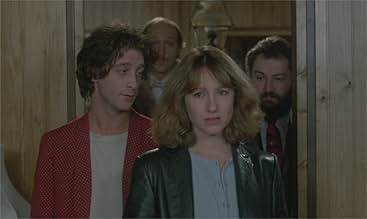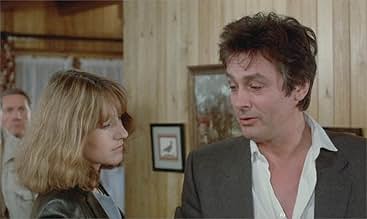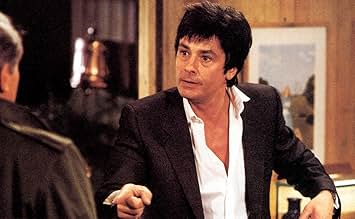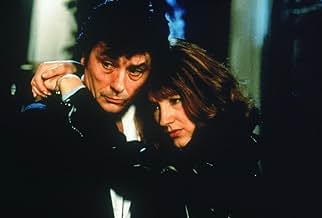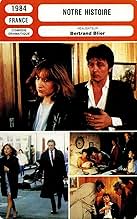Notre histoire
- 1984
- Tous publics
- 1h 50min
NOTE IMDb
6,3/10
1,3 k
MA NOTE
Un alcoolique désespéré atteint un tournant dans sa vie quand il rencontre une étrange femme dans un wagon: ils font l'amour, puis elle s'en va. Poursuivant la fille, il s'accroche à elle co... Tout lireUn alcoolique désespéré atteint un tournant dans sa vie quand il rencontre une étrange femme dans un wagon: ils font l'amour, puis elle s'en va. Poursuivant la fille, il s'accroche à elle comme si elle était sa dernière chance.Un alcoolique désespéré atteint un tournant dans sa vie quand il rencontre une étrange femme dans un wagon: ils font l'amour, puis elle s'en va. Poursuivant la fille, il s'accroche à elle comme si elle était sa dernière chance.
- Réalisation
- Scénario
- Casting principal
- Récompenses
- 2 victoires et 3 nominations au total
Jacques Pisias
- Fred
- (as Firmin)
Avis à la une
Almost the whole film I was actually disgussed at how woman unfriendly it was ("Nouvelle-vague-ish, male gazed" I thought repeatedly). I wanted to stop watching but something in the quality (especially of the acting) held me back. Boy, am I glad I didn't unhook. The end is beautiful and sets the whole story in another perspective, one that is, even for a feminist like me, approvable. Yes there are unbearably sexist scenes, but it all makes perfect sense in the end (it doesn't pass the Bechdel test unfortunately - hence my 8 stars rating, 2 points penalty - but which film of the eighties does?). It turned the movie for me from hateful to adorable.
I actually wanted to watch it again right away, with that new insight in mind. But I had to free space for unwatched recordings so I deleted it. Now I regret. I have to watch it again.
Also: a trip down memory lane, for it is shot in my home region, the high Alps of France. I have been in a similar sports class at a similar school between similar mountains, in similar chalets, with similar ski's in the stairway. Only the people were obviously not from there (accent and demeanor), supposedly all Parisians.
I actually wanted to watch it again right away, with that new insight in mind. But I had to free space for unwatched recordings so I deleted it. Now I regret. I have to watch it again.
Also: a trip down memory lane, for it is shot in my home region, the high Alps of France. I have been in a similar sports class at a similar school between similar mountains, in similar chalets, with similar ski's in the stairway. Only the people were obviously not from there (accent and demeanor), supposedly all Parisians.
Notre Histoire (1984) stars Alain Delon and Nathalie Baye. Delon won the French equivalent of the Oscar, the Cesar, for this. He was not there to accept it. The presenter accepted it and still had it when he died. However to this day it has never shown up.
Robert Avranche (Delon), a garage owner mostly in an alcoholic stupor meets a young woman (Baye) on a train. She tells him a story, in a way fantasizing what will happen to them. They have sex. When she leaves, he follows her, obsessed.
Her name is Donatienne, and she sleeps with everyone. Robert won't leave her house and keeps drinking. The two tell each other stories, writing themselves in and out of them. The neighbors become involved, walking back and forth between houses in their bathrobes.
So what is the story?
This is a bizarre film which is wrapped up at the end, so if you see it, stick with it. It's actually fascinating. Delon is fantastic and deserved the award he received but never had in his hand. This supposedly demolished his super-cool killer image, but he never really gave it up, in my opinion.
Nathalie Baye does a wonderful job as well, playing several different characters.
Interesting movie!
Robert Avranche (Delon), a garage owner mostly in an alcoholic stupor meets a young woman (Baye) on a train. She tells him a story, in a way fantasizing what will happen to them. They have sex. When she leaves, he follows her, obsessed.
Her name is Donatienne, and she sleeps with everyone. Robert won't leave her house and keeps drinking. The two tell each other stories, writing themselves in and out of them. The neighbors become involved, walking back and forth between houses in their bathrobes.
So what is the story?
This is a bizarre film which is wrapped up at the end, so if you see it, stick with it. It's actually fascinating. Delon is fantastic and deserved the award he received but never had in his hand. This supposedly demolished his super-cool killer image, but he never really gave it up, in my opinion.
Nathalie Baye does a wonderful job as well, playing several different characters.
Interesting movie!
Everybody knows that having good actors is considered to be a boon for a film which is acclaimed both commercially as well as critically. However,a good idea is also required to make a successful film by making good use of talented actors.This effect was achieved by maverick French director Bertrand Blier when he was hired by Alain Sarde and Alain Delon to shoot 'Notre Histoire'.Although this film doesn't have a very strong plot,it manages to retain viewers' attention through a series of hilarious episodes which question alcohol, beer, family, loneliness, love,sadness and sex.Apart from the presence of leading players Alain Delon and Nathalie Baye,viewers familiar with French cinema would be comfortable in recognizing other talented French actors namely Gérard Darmon,Michel Galabru,Jean Reno,Jean François Stévenin, Jean Claude Dreyfuss and Jean Pierre Darroussin.As an original idea about some ordinary characters with extraordinary strength, Notre Histoire continues to influence screenwriters especially in the manner it enables numerous stories to be added in a single film.
Please don't get me wrong - I like this movie. It is pure 80's French romantic cinema, has two excellent leads, and like the Flic flicks of the time, has relevant modern themes. It is, however, deeply flawed.
"Notre Histoire" is a classic example of a movie in which an established director carries out all the mistakes he should have shaken off at film school. For instance, Blier is the only director I know who doesn't know how to use music effectively - music is just slotted in at random points, and very unsuitable points at that.
Like a lot of Blier's work, this is a film of confusion, alternative reality and twisted takes on what we call normal life. Its' characters change persona, distance becomes meaningless, relationships blur - yet the film's final few seconds puts everything - and I do mean EVERYTHING - into sharp context.
Essentially, this is a vehicle for Alain Delon, but it's nowhere in the same league as Le Samourai. It's Delon - the King of 60s Cool - playing Robert, a middle-aged man in crisis; yes, playing against type! His marriage is on the rocks, but being Delon, he attracts the attention of wayward young mother Donatienne (Baye). After a fleeting assignation on an SNCF train, Robert won't let go. Donatienne is the woman for him, and he won't give her up! To hell with the marriage, the job, the house, the normal life - let's be reckless!
What follows is a series of surreal set pieces taking Robert from fascination to obsession to the spiritual nature of beer. The surreal nature of the film does throw up some problems as times. The objectification of women for instance; women are displayed as problematic objects for men; inconveniences that get in the way of a good Gallic life. Even Nathalie Baye herself is portrayed as a hooker, wife, mother, teacher and adulteress in many episodes of the tale.
However, the leads are wonderful - Delon gives it his seedy, confused best, whilst Baye (in my mind the most underrated French actress of her generation) gives a wonderful weak/strong performance as the many faces of Donatienne.
Yes, this is a surreal love story. Yes, this is so Gallic it could not be remade in English. Yes, it isn't perfect, but it's an excellent example of a purely French cinema that is simply too homegrown to be appreciated by a wider audience.
"Notre Histoire" is a classic example of a movie in which an established director carries out all the mistakes he should have shaken off at film school. For instance, Blier is the only director I know who doesn't know how to use music effectively - music is just slotted in at random points, and very unsuitable points at that.
Like a lot of Blier's work, this is a film of confusion, alternative reality and twisted takes on what we call normal life. Its' characters change persona, distance becomes meaningless, relationships blur - yet the film's final few seconds puts everything - and I do mean EVERYTHING - into sharp context.
Essentially, this is a vehicle for Alain Delon, but it's nowhere in the same league as Le Samourai. It's Delon - the King of 60s Cool - playing Robert, a middle-aged man in crisis; yes, playing against type! His marriage is on the rocks, but being Delon, he attracts the attention of wayward young mother Donatienne (Baye). After a fleeting assignation on an SNCF train, Robert won't let go. Donatienne is the woman for him, and he won't give her up! To hell with the marriage, the job, the house, the normal life - let's be reckless!
What follows is a series of surreal set pieces taking Robert from fascination to obsession to the spiritual nature of beer. The surreal nature of the film does throw up some problems as times. The objectification of women for instance; women are displayed as problematic objects for men; inconveniences that get in the way of a good Gallic life. Even Nathalie Baye herself is portrayed as a hooker, wife, mother, teacher and adulteress in many episodes of the tale.
However, the leads are wonderful - Delon gives it his seedy, confused best, whilst Baye (in my mind the most underrated French actress of her generation) gives a wonderful weak/strong performance as the many faces of Donatienne.
Yes, this is a surreal love story. Yes, this is so Gallic it could not be remade in English. Yes, it isn't perfect, but it's an excellent example of a purely French cinema that is simply too homegrown to be appreciated by a wider audience.
At first, the impression to discover a collaboration between Pasolini and Fellini.
Then - the touch of Pirandello.
At final, a fairy tale , in modern aspects reminding old fashion Middle East stories.
In fact, a beautiful job of Nathalie Baye and Alain Delon. Especially alain Delon, offering a character just eccentric for his long career.
Provocative ? Not exactly. Only a story of love, illusions and adventures reminding so many cultural islands than it seems a revision of them. Poetic, bizarre and well crafted reflections of love dream, furies and angries and pieces of obsession for ideal of a sort of Don Quixote interpreted by the sex symbol of french cinema.
Then - the touch of Pirandello.
At final, a fairy tale , in modern aspects reminding old fashion Middle East stories.
In fact, a beautiful job of Nathalie Baye and Alain Delon. Especially alain Delon, offering a character just eccentric for his long career.
Provocative ? Not exactly. Only a story of love, illusions and adventures reminding so many cultural islands than it seems a revision of them. Poetic, bizarre and well crafted reflections of love dream, furies and angries and pieces of obsession for ideal of a sort of Don Quixote interpreted by the sex symbol of french cinema.
Le saviez-vous
- AnecdotesAlain Delon's performance in the film earned him the first and only César of his career, winning as Best Actor. He was previously nominated on two other occasions (in the 1970's) for the French equivalent of the Oscars. However, he never received the award. At the 1985 Césars, presenter Coluche accepted the award on Delon's behalf and kept it with him. But after the comedian's death (in 1986), the award was nowhere to be found.
- ConnexionsEdited into Histoire(s) du cinéma: Une histoire seule (1989)
- Bandes originalesConcerto for Two Pianos and Orchestra
Music by Bohuslav Martinu
Meilleurs choix
Connectez-vous pour évaluer et suivre la liste de favoris afin de recevoir des recommandations personnalisées
- How long is Our History?Alimenté par Alexa
Détails
Contribuer à cette page
Suggérer une modification ou ajouter du contenu manquant

Lacune principale
By what name was Notre histoire (1984) officially released in Canada in English?
Répondre

